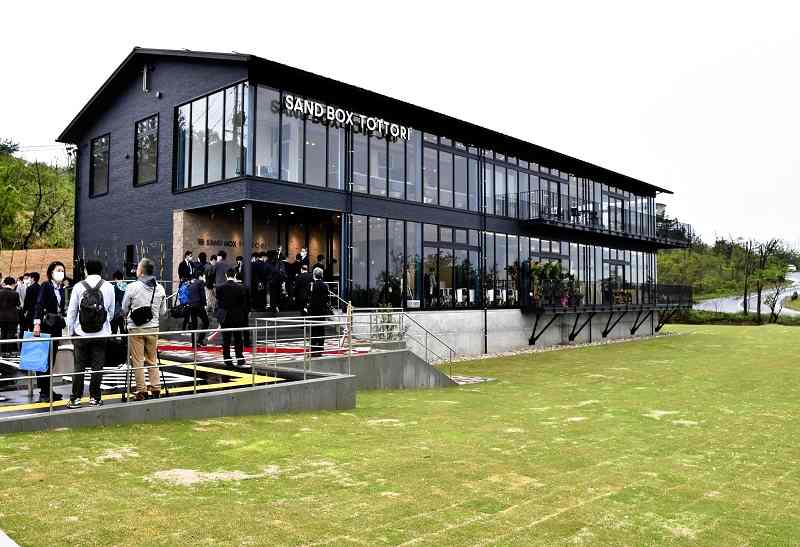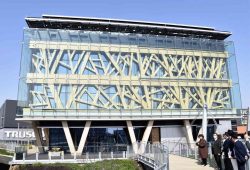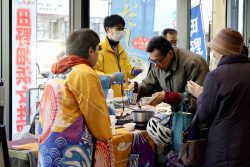
Sand Box Tottori, a workation hub that opened in May in Tottori
1:04 JST, June 25, 2022
The Cabinet Secretariat and the Japan Tourism Agency plan to establish a public-private consultative body to promote working vacations.
The body, which will likely launch by the end of this fiscal year, will communicate the significance and benefits of “workations” and encourage companies to embrace the working style. The initiative also aims to revitalize regional economies, which have been sluggish amid the coronavirus pandemic.
About 30 entities, including local governments, tourism bodies and companies open to the idea, are expected to join the consultative organization. Members will gather case studies from companies that have already introduced workations and regional entities that have hosted significant numbers of “workationers.” The group will work toward normalizing working vacations in Japan such as by serving as an intermediary between companies and regional entities.
Teleworking has become more popular as a result of the pandemic, and workations are attracting increasing attention. For example, an employee might lodge for a time in a nature-rich regional area, working remotely on weekdays and vacationing on weekends. Some observers say this type of working style boosts work efficiency and helps generate new ideas.
In Japan, demand for travel rises at certain times of the year, such as weekends, extended holidays and the year-end holiday season. But travelers usually rack up shorter consecutive overnight stays than people in Western countries, which is believed to be a factor in the sluggish growth of domestic travel spending.
Workationers, however, usually make longer sojourns that include weekdays, leading to high hopes among people and businesses in regional areas. This has prompted local governments, such as Hyuga, Miyazaki Prefecture, to start building workation hubs.
To date, uptake of the working style has been relatively slow. According to an online survey of 600 companies conducted last year by the tourism agency, only 5.3% of respondents said they had introduced working vacations. Among reasons cited for their lack of introduction, respondents said, “It’s difficult to distinguish between work and a vacation,” and “Their effectiveness can’t be gauged.”
On June 17, the tourism agency began seeking companies and local governments to take part in an experimental project at about 30 locations nationwide. The project will examine whether working vacations improve concentration and reduce stress levels by having employees of participating companies spend time in regional areas and interact with local residents. Experts will provide advice to participating companies and regional entities, and expenses — such as accommodation costs — will be covered by the central government.
Top Articles in Business
-

Prudential Life Insurance Plans to Fully Compensate for Damages Caused by Fraudulent Actions Without Waiting for Third-Party Committee Review
-

Narita Airport, Startup in Japan Demonstrate Machine to Compress Clothes for Tourists to Prevent People from Abandoning Suitcases
-

JR Tokai, Shizuoka Pref. Agree on Water Resources for Maglev Train Construction
-

KDDI Opens AI Data Center at Former Sharp Plant in Osaka Prefecture; Facility Will Provide Google’s Gemini AI Model for Domestic Users
-

Toyota Motor Group Firm to Sell Clean Energy Greenhouses for Strawberries
JN ACCESS RANKING
-

Japan Institute to Use Domestic Commercial Optical Lattice Clock to Set Japan Standard Time
-

Israeli Ambassador to Japan Speaks about Japan’s Role in the Reconstruction of Gaza
-

Man Infected with Measles May Have Come in Contact with Many People in Tokyo, Went to Store, Restaurant Around When Symptoms Emerged
-

Prudential Life Insurance Plans to Fully Compensate for Damages Caused by Fraudulent Actions Without Waiting for Third-Party Committee Review
-

Woman with Measles Visited Hospital in Tokyo Multiple Times Before Being Diagnosed with Disease

























